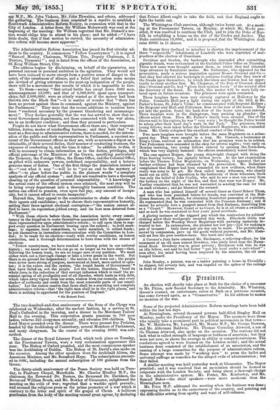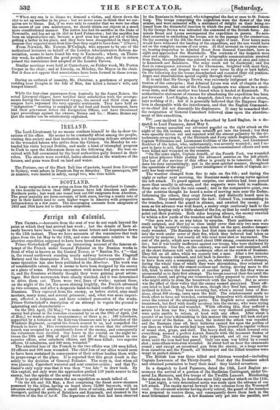iht Vreniurro.
An election will shortly take place at Bath for the choice of a successor to Mr. Phinn, now Second Secretary to the Admiralty. Mr. Whateley, Queen's counsel, an unfortunate suitor at Bath on a previous occasion, has come forward again, as a "Conservative." In his address he makes no mention of the war.
Some of the projected Administrative Reform meetings have been held within the last ten days. At Birmingham, several thousand persons half-filled Bingley Hall on Monday, under the Presidency of the Mayor. The speakers were those who usually take a prominent part in political movements in that town— Mr. W. Matthews, Mr. Langford, Mr. Muntz M.P., Mr. George Dawson, and Mr. Alderman Baldwin. Mr. Thomas Cornelius Attwood, a son of the Thomas Attwood, also spoke on the occasion. The orations did not lack what is called strength of language or boldness of assertion; but they were pot new, or above the average in ability or comprehensiveness. The resolutions agreed to were framed on the London model ; and the actual business done consisted of the establishment of an association, and the naming of a large committee for the purpose of administrative reform. Some attempt was made by " working men " to press the ballot and universal suffrage as remedies for the alleged evils of administration ; but they failed. A similar meeting was held yesterday week at Gloucester. The Mayor presided ; and it was resolved that an association should be formed to cooperate with the London Society, and bring about a thorough change in the administrative system. Mr. Potter, Mr. Kimberley, and Mr. Samuel Baker—the chief speakers—were more moderate than the Birmingham men. Mr. Price M.P. addressed the meeting when the business was done; expressing doubts as to the earnestness of the country, and pointing out the difficulties arising from apathy and want of self-reliance.
" When any one is to blame we demand a victim, and throw down the idol to set up another in its place ; but we never seem to think that we our- selves are to blame. Bat, if we were only to consider that we were too often the causes of our own misfortunes, we should obtain our objects in a much more constitutional manner. The nation has had its sacrifice in the Duke of Newcastle, and has set up its idol in Lord Palmerston ; but the sacrifice has been an unproductive one, because a good man has been got rid-of without getting a better in his place, and they have been disappointed in their idol, because they expected more from him than they ought to have done." (Cheers.) From Norwich, Mr. Torrents M'Cullagb, who appears to be one of the authorized lecturers on behalf of the London Administrative Reform As- sociation, seems to have found his way to Yarmouth ; where, on Thurs- day week, he addressed the good people of that place, and they in return passed the resolutions first adopted at the London Tavern.
Similar meetings were held at Canterbury, on Friday week, Mr. Purton Cooper in the chair; and at Lincoln, on Monday, the Mayor in the chair. But it does not appear that associations have been formed in these towns.
During an outbreak of insanity, Mr. Christian, a gentleman of property residing near Douglas in the Isle of Man, has killed a farmer's wife, and hanged himself.
Whjle the first-class passengers from Australia by the James Baines, the noted Liverpool clipper, have testified their satisfaction with the arrange- ments during the recent homeward voyage, the second and third class pas- sengers have expressed the very opposite sentiments. They have held an "indignation" meeting to complain of bad food and harsh treatment, have laid their grievances before the Emigration Officer, and have threatened legal proceedings against the owners, Baines and Co. : Messrs. Baines say ;bat the matter can be satisfactorily explained.



































 Previous page
Previous page